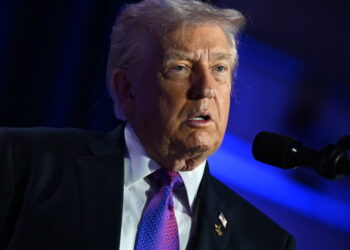The first week of the month was supposed to be a good one for the BBC. On Thursday, Nov. 6, the finale of its smash hit “The Celebrity Traitors” was airing, and millions of Britons were expected to tune in to watch a host of stars scheme and connive in the elegant surrounds of a Scottish castle. But by the time they did (Alan Carr, a comedian, was the victor), the British Broadcasting Corporation was once again mired in crisis.
Earlier that week, details from a leaked memo published in the conservative Telegraph newspaper had described, among other failings, a misleading edit of a video of President Trump’s speech before the Jan. 6, 2021, attacks on the U.S. Capitol. By Sunday, the scandal had escalated into a frenzy that claimed the resignations of the broadcaster’s director general and its head of news.
And it’s not over yet. This latest ruckus arrived just as a debate is about to start on the BBC’s future role and funding, with its Royal Charter up for renewal in 2027. In an increasingly polarized political and media landscape, the broadcaster has struggled to navigate its public interest remit and has proved inept at learning the lessons when it fails. If the BBC, one of the icons of Britain, can’t prove it can change, it could find its very future imperiled.
Informally referred to as “Auntie Beeb” (others have used more choice language, such as Paul Marshall, a media baron who is an investor in GB News, a hard-right cable channel, who once branded it a “giant toad”), the BBC, like the National Health Service, has occupied a central role in Britain since the first half of the 20th century. To get a picture of British life in that century you could do worse than to scroll through the BBC’s vast archives of footage: It broadcast Churchill’s speeches during World War II (even if he privately griped about its lefty bias), Queen Elizabeth II’s coronation in 1953 and King Charles III’s 70 years later. David Attenborough made his career in its Natural History Unit, and it has brought the world exceptional comfort viewing like “The Great British Bake Off,” “Gardeners’ World” and, perhaps more questionably, “Strictly Come Dancing.”
But in our more fragmented age, where the very question of what it means to be British has become more complicated to answer, the place of a broadcaster that prides itself on its universality and impartiality has become more precarious.
The BBC has made some unforced errors. The crises of the past few years have been legion. In his five-year tenure, Tim Davie, the outgoing director general, had to apologize for an infamous interview with Princess Diana conducted by Martin Bashir 25 years earlier, when it came to light that the correspondent had deceived her brother to get the interview. In 2023 a BBC News anchor, Huw Edwards, was suspended and later pleaded guilty to three counts of making indecent images of children. This year, Mr. Davie faced uproar over the BBC’s coverage of the Glastonbury music festival when it failed to cut away from a band chanting “Death, death to the I.D.F.!” and pulled a documentary on Gaza from its streaming service when it emerged that the father of its teen narrator was a Hamas official.
The Panorama documentary that included the misleadingly edited clip of Mr. Trump’s speech aired more than a year ago, but it wasn’t until last week’s leak that it came more publicly to light. At issue: The show spliced together sections of Mr. Trump’s speech more than 50 minutes apart, which gave the impression that he had explicitly encouraged the U.S. Capitol attack on Jan. 6. The leak sparked a political firestorm with the right resurfacing its outrage at the BBC’s perceived bias and demanding it be defunded, and Mr. Trump threatening a $1 billion lawsuit.
The BBC responded to Mr. Trump on Thursday. It issued an apology and pledged not to show the program again. But it rejected his demands for compensation, and added, “We strongly disagree there is a basis for a defamation claim.”
The nature of the BBC’s business model sits at the center of the debate about its place in modern Britain. The broadcaster gets most of its funding from a license fee, about $230 annually that all households that watch live TV must pay, regardless of whether they watch the BBC (odds are they do — it remains the most-watched broadcaster in Britain) or use its streaming service. For fans, the license fee is precisely why the BBC is a national treasure — it allows the corporation to be a quality broadcaster for all corners of society and a gold standard in news. For its political enemies and media rivals, that guaranteed funding distorts the media landscape, and allows the BBC to march cheerfully from scandal to scandal without learning the lessons other media companies would be forced to confront.
It’s essential to at least try to maintain an independent broadcaster with universal ambitions, especially as people retreat further into their own bubbles. The challenge is that competence and quality are expensive, and all signs suggest the BBC will have to do more with less. Inflation and the cost of living remain high in Britain, and the right-wing Reform U.K. party, led by Nigel Farage, continues to gain popularity. The license fee is going to keep coming under attack.
The BBC may need to accept that its future lies in a mixed funding model: a combination of a means-tested license fee, subscriptions for top-notch programming and a further push into the commercial space. The latter is somewhat familiar territory, since it already licenses shows and sells advertising overseas to make up for a shortfall in its accounts after years of financial and political pressure.
The question of how to be a public broadcaster isn’t going to get easier — Britain is not about to go back to being one nation under Auntie Beeb, if it ever was — but the BBC can do better in the attempt. More immediately, it needs to focus on building back the trust of the public by embracing transparency. One good way of doing so would be to publicly address errors as soon as they’re discovered. And it could certainly do with a refresher on how to put its best foot forward and improve its dialogue with the public.
It’s been a BBC in retreat for years. It would be tragic if this became a death spiral.
Merissa Marr is a British journalist and a former media editor for The Wall Street Journal.
The Times is committed to publishing a diversity of letters to the editor. We’d like to hear what you think about this or any of our articles. Here are some tips. And here’s our email: [email protected].
Follow the New York Times Opinion section on Facebook, Instagram, TikTok, Bluesky, WhatsApp and Threads.
The post The BBC Is Inept, Imperiled and Absolutely Essential appeared first on New York Times.




